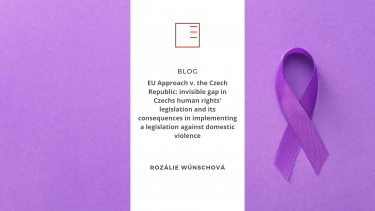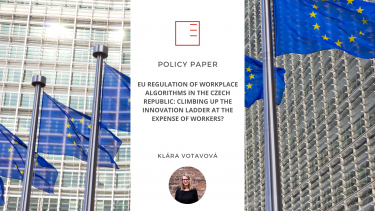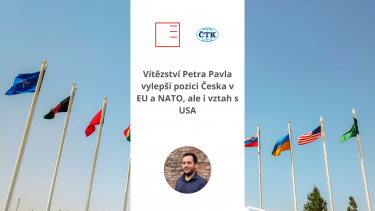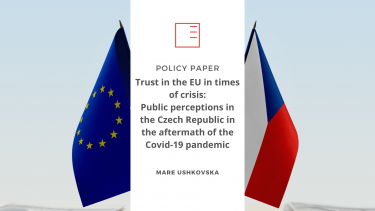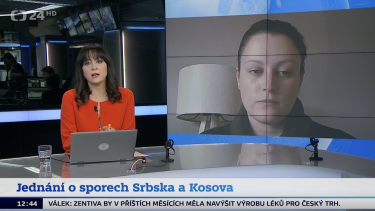POLICY PAPER | Shifting the gender quota debate from underrepresentation of women to overrepresentation of men within diplomacy
Ivana Uličná writes about the fact that even though some progress has been made towards gender equality in diplomacy, women remain underrepresented in ambassadorial positions worldwide. Quotas have been effective in boosting nominal representation of women but critiques focused on quotas being tokenistic and harming meritocracy place a double burden on women. However, even the current system is not meritocratic, as men benefit from a historical advantage and assumed competence, while women must justify their presence, prove their worth and disprove gender stereotypes.
Show moreBLOG: EU Approach v. the Czech Republic: invisible gap in Czechs human rights' legislation
Rozálie Wünschová writes in her blog that the Czech Republic is one of only two EU countries where corporal punishment of children is still legally permitted. Together with Slovakia, this puts the Czech Republic behind not only the Nordic countries, where corporal punishment was banned in the last century but also countries such as Turkmenistan, which adopted protective legislation in 2007.
Show more PDFBLOG | European Media Freedom Act on the case of Slovenia: Has Slovenia overtaken the European Commission with its new law?
In September 2022, the European Commission put forward a proposal for a new media regulator - the European Media Freedom Act. Slovenia is one of the most struggling EU countries in terms of media freedom and independence. In the summer of 2020, the Janša government proposed a media-focused law that would increase the state's influence over Slovenia's national press agency and limit its funding of the public broadcaster RTV. Has Slovenia's new law put the European Commission ahead of the game? That is what our intern Klára Landová discusses in her blog.
Show moreSUMMARY OF EXPERIENCES WITH THE INVOLVEMENT OF CSOS IN V4 IN THE DECARBONISATION PROCESS
The project is focused on the examination of the role of non-governmental organizations in the process of decarbonization of coal regions in V4 countries (Czech Republic, Hungary, Poland, Slovakia). The aim of the project is to describe the best and worst practices of the individual processes for Serbia, who awaits the transformation of its energy mix, largely based on coal. The examined V4 countries have had a slightly different share of coal in their energy mix, while the largest one being in Poland and the second largest one in the Czech Republic, followed by Hungary and Slovakia. There are many similarities and differences in their takes on decarbonisation, thus providing different range of experiences.
Show more PDF

Report | Monitoring of the EU's Green Policies: Perceptions and Narratives in the Czech and Slovak Information Space
The European Green Deal is the core of the current climate strategy of the European Union, which has set the goal of making Europe a carbon-neutral continent by 2050. In an effort to monitor and counter disinformation narratives about the deal, IRI's Beacon project launched an initiative called the “European Green Deal: Mapping perceptions in Central and Eastern Europe,” in which six partner organizations studied how the deal is perceived in Bulgaria, Czechia, Poland, Romania, and Slovakia. Our project manager and juniour researcher, Tatiana Mindeková, analyzed narratives spread about the Green Deal and the EU’s green policies through Czech chain emails as well as through selected mainstream media and websites known for spreading disinformation.
Show more PDFPolicy Paper | EU Regulation of Workplace Algorithms in the Czech Republic: Climbing up the Innovation Ladder at the Expense of Workers?
Our researcher Klára Votavová has written a policy paper in which she discusses the new dilemmas concerning the balance of competitiveness and decent work standards in the Czech Republic, which are emerging with advancing digitalization and automation.
Show more PDFČTK: Petr Pavel's victory will improve the Czech Republic's position in the EU and NATO, but also relationship with the USA
The head of our Brussels office, Žiga Faktor, commented for ČTK on Saturday's victory of Petr Pavel in the presidential elections on the relationship with the EU and NATO. He mentioned that Pavel's accession could bring about a unification of the foreign policy of the government and the Foreign Ministry. He also suggested that the newly elected president would have better relations with the United States
Show more
Policy Paper | Trust in the EU in times of crisis: Public perceptions in the Czech Republic in the aftermath of the Covid-19 pandemic
How has the Covid-19 pandemic affected the Czechs' relationship with the European Union? This topic is addressed in a policy paper by visiting fellow Mare Ushkovska.
Show moreStudio ČT24: Negotiations on Serbia-Kosovo disputes
Our senior researcher was a guest on Czech Television's Studio 24, where she spoke about Serbia's current negotiations with Kosovo in Belgrade.
Show moreVOXPOT: The EU, with Sweden at the helm, is heading into uncharted waters. Green Europe and migration solutions on the horizon
At the turn of the year, Sweden took over the Presidency of the Council of the EU from the Czech Republic and will be responsible for leading the Union for the next six months. Although the Swedes have a reputation for being solid and liberal-minded partners, there are concerns about the great unknown because of the composition of their current government. For the first time in history, it is supported by the far-right Sweden Democrats. Our Senior Research Fellow Vít Havelka wrote this article for VOXPOT.
Show more
Staroměstské náměstí 4/1
Prague 1 - Staré Město
110 00
tel.: +420 212 246 552
email: europeum@europeum.org
https://www.europeum.org

